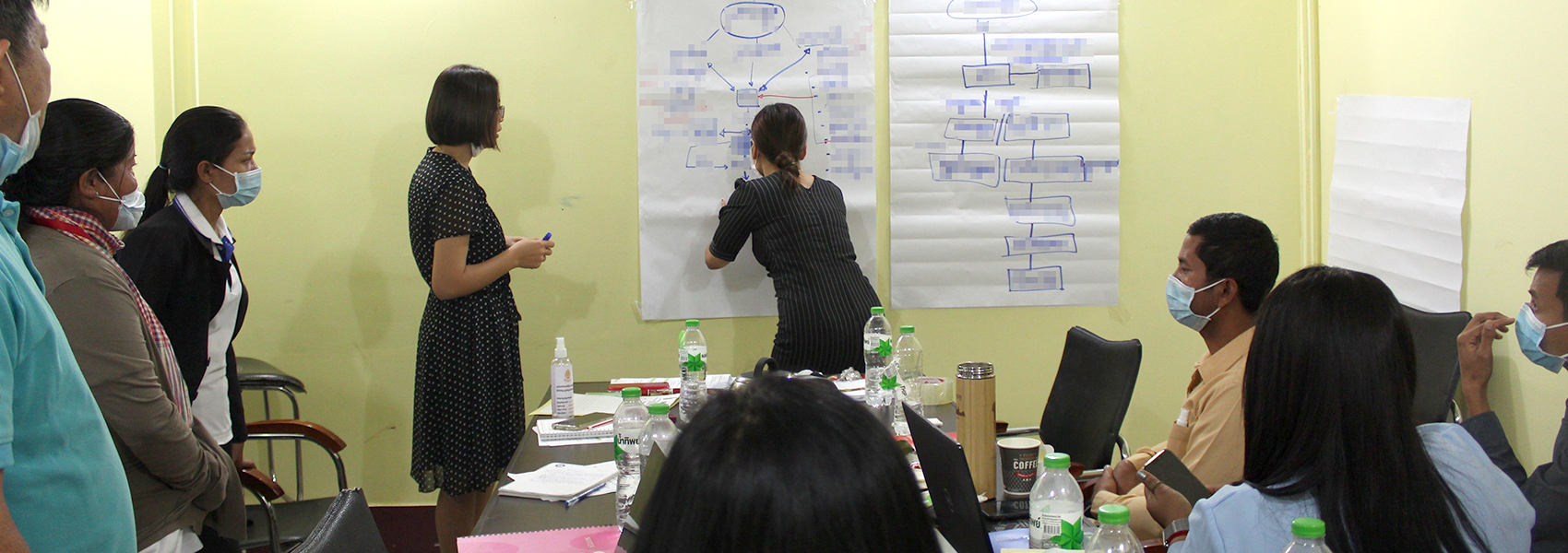Returning Home
After Risking It All
Thom was barely 22 years old when he boarded a bus destined for Malaysia. His parents had begged him not to go. They’d heard what happens to workers who travel abroad: some people lose contact with their families for years—others don’t come back at all.
But on his family’s farm, his parents and siblings were living each day with barely enough food to survive.
He’d heard rumours of lucrative opportunities in other countries. So, Thom met with a broker who promised high wages, plenty of rest and even medical care. It was all the reassurance he needed to dismiss his parents’ concerns.
It wasn’t until the bus crossed the Poipet border from Cambodia to Thailand that he began to worry. He was utterly alone, especially since he didn’t speak the language. For the first time, Thom wondered if he’d made a mistake, but it was too late to turn back now.
I started to get scared during my travel. I had heard it before… that some migrant workers lost their lives overseas. But I had already got on the bus; it was too late.
Upon arriving in Malaysia, Thom was immediately put to work at a plastic manufacturing company, earning less than half of what he was promised. He worked long hours with little to no rest, 7 days a week.
His minimal pay left him with very little money for food and accommodation. Hungry and worn down, Thom spent each night in deep regret, living in a cramped bedroom with 20 other men because it was all he could afford.
Five months passed, until one day the factory doors burst open and men in uniforms filled the building. Thom and his coworkers were taken to a detention centre. He had no idea what was happening, until his cellmate told him he’d been arrested for illegal migration.
How could this be? Thom thought. He was there legally with a valid passport! What he didn’t know was that the broker had lied to him and never applied for a proper work permit on his behalf. His tourist visa had quickly expired and he had become an illegal migrant without even knowing.
In jail, Thom was yelled at, threatened and malnourished for 44 long days. Finally, Malaysian officials brought him to the Cambodian embassy and his return home was arranged.
When he arrived at the Phnom Penh airport, officials interviewed Thom and identified him as a survivor of human trafficking.
When he returned home, his parents were overwhelmed with joy, welcoming him back with tears in their eyes. Despite the happy reunion, nothing had changed. Thom still faced financial hardship and limited opportunity. And now he had to deal with trauma, disappointment and shame.
Thankfully, it wasn’t long until Ratanak reached out to follow up. The airport officials had taken swift action to refer Thom’s case to us in order to ensure he received timely support.
Ratanak was able to supply Thom and his family with food and a water purifier, items essential to their immediate wellbeing. From there, our staff provided Thom with ongoing therapy where he learned coping mechanisms that have since helped him overcome his trauma.
To provide economic empowerment and help with his farm production, Thom was also equipped with a small boat and an air-seeding machine. This will allow his family to feed themselves and enable Thom to expand the farm and build a profitable business.
Today, Thom is happily married—he and his wife have their first baby on the way! And it’s thanks to Ratanak supporters like you that Thom is now able to provide a stable living for his new family.
Systems of survivor identification prevent trafficking survivors like Thom from being missed, forgotten and left without support. Thank you for helping us work hand-in-hand with officials to reach survivors quickly.

Collaborating to Identify Trafficking Survivors
Over a million Cambodians like Thom work outside the country to find better paying jobs. Many don’t have the proper documents to do so but are tricked by brokers who convince them to cross the border.
Hundreds of migrant workers are deported back to Cambodia every week—some having endured the trauma of trafficking and exploitation. Without support, survivors returning home are vulnerable to depression, shame, discrimination, and some even fall victim to being trafficked again.
Most Cambodians who have been deported from Thailand are processed at the Poipet border and neighbouring border crossings. Through the newly-established Survivor Identification Project, Ratanak is partnering with the Cambodian government, helping border officials at these key locations to identify survivors of human trafficking.
With this new collaborative project, survivors who were likely to slip through the cracks will now have access to Ratanak’s immediate care, case management and referrals to long-term support. It’s only thanks to generous gifts like yours that we can innovate and expand our reach to help more people like Thom who would otherwise be missed or forgotten. Thank you for helping us give trafficking survivors the mental health support to recover, and the economic empowerment to build a brighter future.

Leading By Example:
Thank You Paul Brandt!
Country music singer, Paul Brandt, lives in Calgary where he’s the chair of Alberta’s Human Trafficking Task Force and the founder of #NotInMyCity—an organization working to disrupt human trafficking in Canada. Paul took up the cause 15 years ago during a trip to Cambodia where he was first introduced to Ratanak’s work.
“It became clear to me that I had to lead by example and to put my resources behind the good work of Ratanak. Not only has the pioneering work of Ratanak positively impacted the lives of countless people in Cambodia through rescue, rehabilitation, and recovery, Ratanak’s work has had ripple effects all around the world.
It’s amazing how it works. When you stand up against trafficking, it emboldens victims and survivors, but it also reinforces the cause globally. As one of the fastest growing crimes in the world, and the second largest source of illegal income globally, it will take all of us working together to remain vigilant and effective in disrupting human trafficking.
Your leadership and dedication are world-class and your efforts change lives. Thank you Brian and everyone at Ratanak for the inspiring work that you do.”
A Message From Brian
Cambodian trafficking survivors aren’t so different from you or me. They, however, live amidst social systems that are rebuilding with limited protections. These men and women seek to free their families from overwhelming medical bills, help struggling parents out of years of back-breaking poverty or provide school fees so a younger sibling can get an education—all powerful motivators to take great risk!
Circumstances like these lead to desperate decisions. No matter how noble their intentions, there are traffickers waiting to take advantage of such desperation. Yet, who would not take risks for their loved ones? Tragically, these risks often lead to life-destroying consequences.
You are providing another chance… the chance to identify Cambodians who have survived the unthinkable, so that instead of disappearing into the dark shadows of despair, they can be seen, known and shown the love of Christ. You are key in the fight for freedom, helping to establish systems that protect the vulnerable, ensuring survivors receive restorative care and keep their families safe. Thank you!


Brian McConaghy
Founding Director
Names, images and/or some details have been altered as appropriate to protect the identities of those in our care
